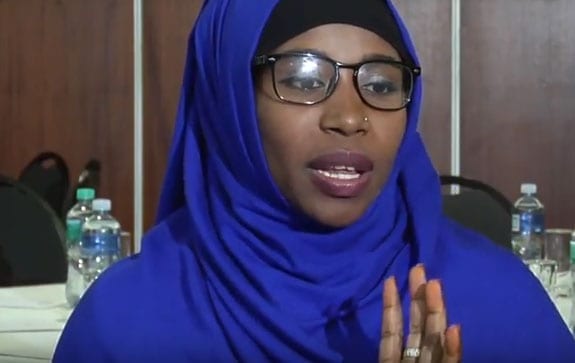When Fauzia Muthoni arrived in Qatar from Kenya to work as a receptionist and earn money to support her family, the labor agent traveling with her informed Muthoni the job was in Saudi Arabia and escorted her to another plane. She tried calling her family, but realized her sim card did not work in the region. She asked to speak to the contact she was given by the labor recruiter in Kenya who arranged her job, but was told she could not contact him.
Trapped, she was taken to Saudi Arabia where she was forced to work in the homes of multiple households, cleaning, cooking and taking care of children. She was not allowed to contact her family. Back home in her town outside Nairobi, her mother repeatedly visited the labor broker to find out about her daughter, only to be told to come back the next week.
Muthoni worked for three years, toiling up to 18 hours a day, before finally escaping to a police station and ultimately back to Kenya. She was not paid for any of her work.
“They don’t think of you as a human being, they think of you as a slave to them,” she says.
Muthoni’s experience—repeated in various forms hundreds of thousands of times around the world each year—illustrates the difficulties migrant workers face in accessing justice, including assistance in leaving unsafe working conditions and claiming unpaid wages.
Migrant Workers among 25 Million Trapped in Forced Labor
Migrant workers in 2013 accounted for 150 million of the world’s approximately 232 million international migrants. Most travel for work to countries where they are prohibited from forming unions and so unable to exercise their fundamental rights at work. They are among the 25 million people trapped in forced labor. Human trafficking is a big business, with illegal profits of roughly $150 billion a year.
U.S. National Slavery and Human Trafficking Prevention Month offers a time to amplify their experiences, which often begin when unscrupulous labor brokers prey on residents of communities in extreme poverty, falsely promising good wages and jobs in more wealthy countries like those in the Middle East, Europe and the United States. Many who take jobs abroad through exploitative labor brokers often do not know their rights—and even when they do, have no access to justice.
That’s why the Solidarity Center, which holds trainings around the world for potential migrant workers to ensure they know their rights, is increasingly working to ensure migrants can exercise those rights.
In Bangladesh, where the Solidarity Center is partnering with the Bangladesh Obivashi Mohila Sramik Association (BOMSA) and the WARBE Development Foundation, nearly a dozen migrant workers were recently returned to Bangladesh after reporting abuse on the job in other countries. All reported unfair recruitment practices, long working hours, unfair compensation, and assault. Three received compensation from recruiting agencies and the Bangladesh government. They also received assistance in the form of food and transportation expenses incurred during their trip back to Bangladesh.
Migrant Worker Rights the Same as All Workers
The United Nations is currently considering a Global Compact on Safe, Regular and Orderly Migration, which would be the first such agreement to cover all dimensions of international migration. Regulating labor brokers and ensuring access to justice are part of the broader spectrum of human and worker rights migrant workers must be guaranteed in the agreement, says Neha Misra, Solidarity Center Migration and Human Trafficking senior specialist.
“We cannot promote the contributions of migrant workers as stakeholders in sustainable development without providing them with options for fair migration,” she says. “This means migrant workers – regardless of status, sector, visa type, nationality or gender —must be treated equal to all other workers. We must develop cross-border mechanisms to allow migrant workers to access justice, remedies and compensation when unscrupulous employers steal their wages, or they are injured on the job, or they are trafficked or face gender-based violence in the workplace. This would go far in mitigating the inherent risks in migration, advancing equality in the workplace and promoting fair and sustainable development.”
Back in Kenya, Muthoni works with the Kenya Union of Domestic, Hotel, Educational Institutions, Hospitals and Allied Workers (KUDHEIHA), educating women on their rights when they seek to migrate for work abroad.
Says Muthoni: “I need to share my experience with people who want to go so they can know” their rights.

